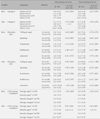Abstract
Purpose
The purpose of this study was to examine the association between the parenting characteristics and problem behaviors of school-aged children living in poverty.
Methods
With a cross-sectional study design, the Child Behavior Checklist (CBCL) was utilized to collect data from 190 primary caregivers of children in low income families in one middle-size city in South Korea.
Results
Among the children's characteristics, only school performance showed significant association with problem behaviors and children's age and gender were not associated with problem behaviors. Among the primary caregivers' parenting characteristics, discipline style, rearing confidence, and concerns for their children showed significant association with problem behaviors for girls, but not for boys. Parenting attitude was not related to problem behaviors with either girls or boys.
Conclusion
The findings of this study indicate that the parenting characteristics of low income primary caregivers are important in children's problem behaviors, especially for girls and parent education programs for child rearing, including methods of discipline for both boys and girls, are effective nursing interventions.
Figures and Tables
References
1. Achenbach TM. Manual for the child behavior checklist 4-18. Burlington: University of Vermont;1991.
2. Ahn HW, Lee JY. Moderating effects of parental attachment and parental monitoring in the relationship between adolescent stress and problem behaviors. Korean J Child Stud. 2009; 30:77–88.
3. Assis SG, Avanci JQ, Oliveira Rde V. Socioeconomic inequalities and child mental health. Rev Saude Publica. 2009; 43:Suppl 1. 92–100.
4. Bang KS. Preschooler's behavior problems and relating factors in poverty group. J Korean Acad Soc Nurs Educ. 2009; 15:321–328.

5. Bordin IA, Duarte CS, Peres CA, Nascimento R, Curto BM, Paula CS. Severe physical punishment: Risk of mental health problems for poor urban children in Brazil. Bull World Health Organ. 2009; 87:336–344.

6. Chung MJ, Lee M, Jeon YJ. Clinical and normal children with internalizing or externalizing behavior problems: Differences in demographic and functional family variables. Korean J Child Stud. 2007; 28:251–265.
7. Choi YJ, Choi SB. Children's social relationships, psychological characteristics, and behavior problems. J Korean Home Econ Assoc. 2007; 45:75–89.
8. Galambos NL, Barker ET, Almeida DM. Parents do matter: Trajectories of change in externalizing problems in early adolescence. Child Dev. 2003; 74:578–594.

9. Han HA, Doh HS. The effects of family risk factors, ego-resilience and quality of peer relationships on adolescent problem behaviors. Korean J Child Stud. 2008; 29:87–101.
10. Hill NE, Bush KR. Relationships between parenting environment and children's mental health among African American and European American mothers and children. J Marriage Fam. 2001; 63:954–966.

11. Hong SH, Lee SY. The impact of childrearing stress of primary childrearers on psychosocial adaptation of children: Mediating effect of child neglect and communication between primary childrearers and children. J Korean Soc Child Welf. 2009; 28:137–169.
12. Hyun MS, Nam KA, Kong SS. A study of relationship between adolescents' sexual development and problem behavior and depression. J Korean Acad Psychiatr Ment Health Nurs. 2001; 10:533–547.
13. Kim HJ. Chilren's probelm behavior and parenting style: Does gender socialization matter? Korean J Woman Psychol. 2001; 6(2):81–95.
14. Kim MJ, Doh HS. The influence of parenting behaviors, marital conflict, and sibling relations of aggression in children. Korean J Child Stud. 2001; 22:149–166.
15. Kim S, Kim S, Kong SS, Kim MA, Seo M. Behavior problems, self-esteem, social skills, and depression in middle school male students. J Korean Acad Psychiatr Ment Health Nurs. 1998; 7:273–282.
16. Kwon M, Kim H, Ahn H, Lee J. Children's perception of mother's child-rearing attitudes and problem conduct of children. J Korean Acad Child Health Nurs. 2005; 11:132–141.
17. Laskey BJ, Cartwright-Hatton S. Parental discipline behaviors and beliefs about their child: Associations with child internalizing and mediation relationships. Child Care Health Dev. 2009; 35:717–727.

18. Lee KH. The effect of poverty and parental behavior for predicting high level physical aggression. Korean J Child Stud. 2004; 25(5):1–9.
19. Lee JY, Baik JJ. The relation between the psychological environment of family and maladaption behavior that perceived by the children of low income family. Sookmyung J Sci Better Living. 1997; 12:71–93.
20. Lee BJ, Yang S, Kim MS. Need assessment and support of welfare, education, and health need for 'We Start Kyounggi Do' area. Suwon: Gyeonggi-do Office, Department of Health and Welfare;2004.
21. Liu X, Kurita H, Guo C, Miyake Y, Ze J, Cao H. Prevalence and risk factors of behavioral and emotional problems among Chinese children aged 6-11. J Am Acad Child Adolesc Psychiatry. 1999; 38:708–715.

22. Moon YS, Park IS, Park YO. Prediction model of child behavioral problems in the school age children. J Korean Acad Child Health Nurs. 2006; 12:514–522.
23. Nam KA, Cho Chung HI, Hyun MS, Noh CH. A correlation study among family function, occurrence and perceived seriousness of problem behaviors for female middle school students. J Korean Acad Psychiatr Ment Health Nurs. 2006; 15:161–169.
24. Oh KJ, Lee HL, Hong KY, Ha WH. Korean child behavior checklist. Seoul: Chungang Aptitude Publication;1997.
25. Oh KJ, Moon KJ. Poverty and psycholosocial adjustment of adolescents: Mediating effects of family risk factors and parent-child relations. Korean J Clin Psychol. 2006; 25:59–76.
26. Oh HO, Oh SY, Kim YH. Mother's characteristics, disciplinary methods, & young children's emotional regulation associated with young children's aggression. J Korean Home Econ Assoc. 2007; 45(2):1–22.




 PDF
PDF ePub
ePub Citation
Citation Print
Print







 XML Download
XML Download